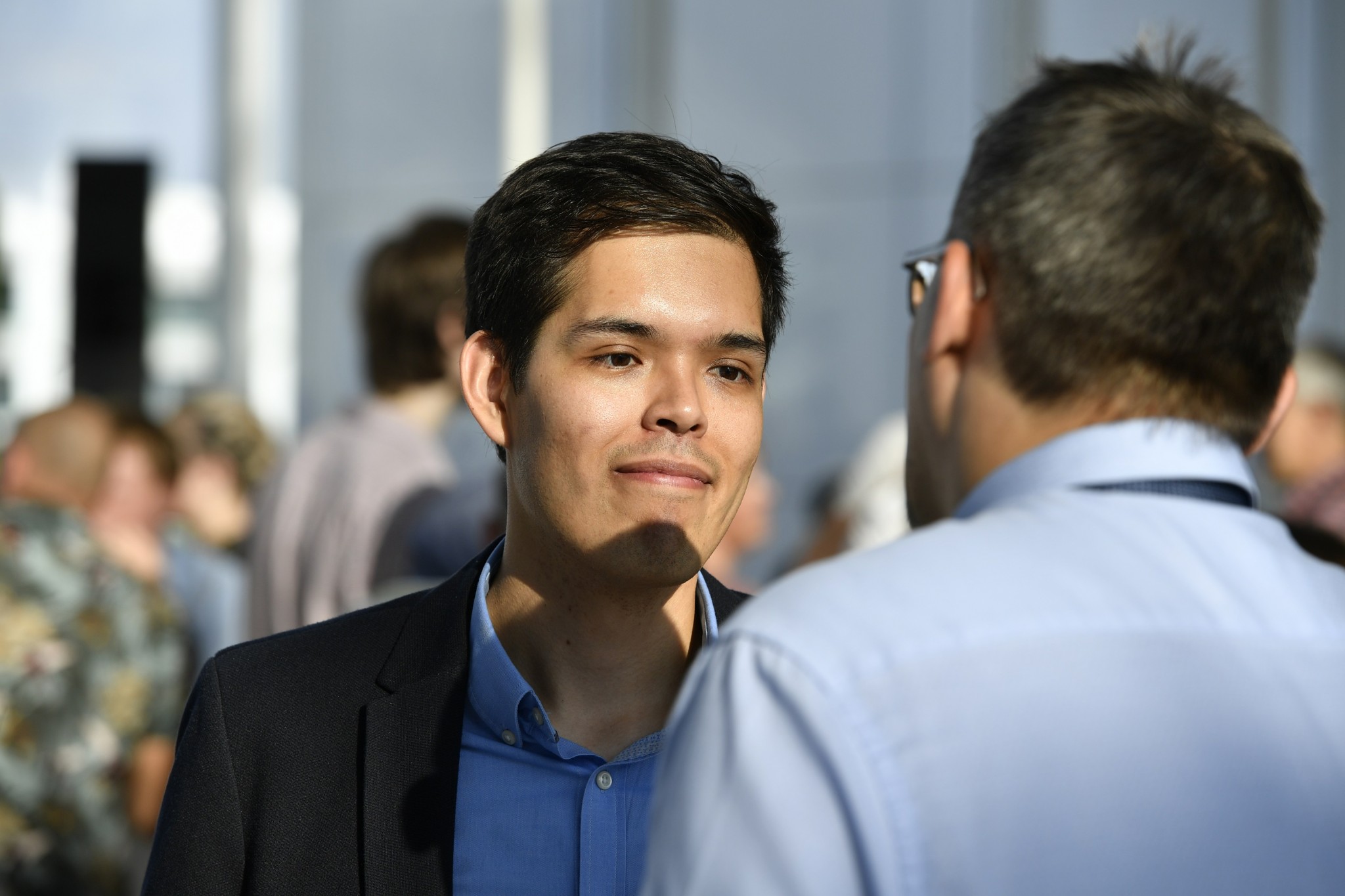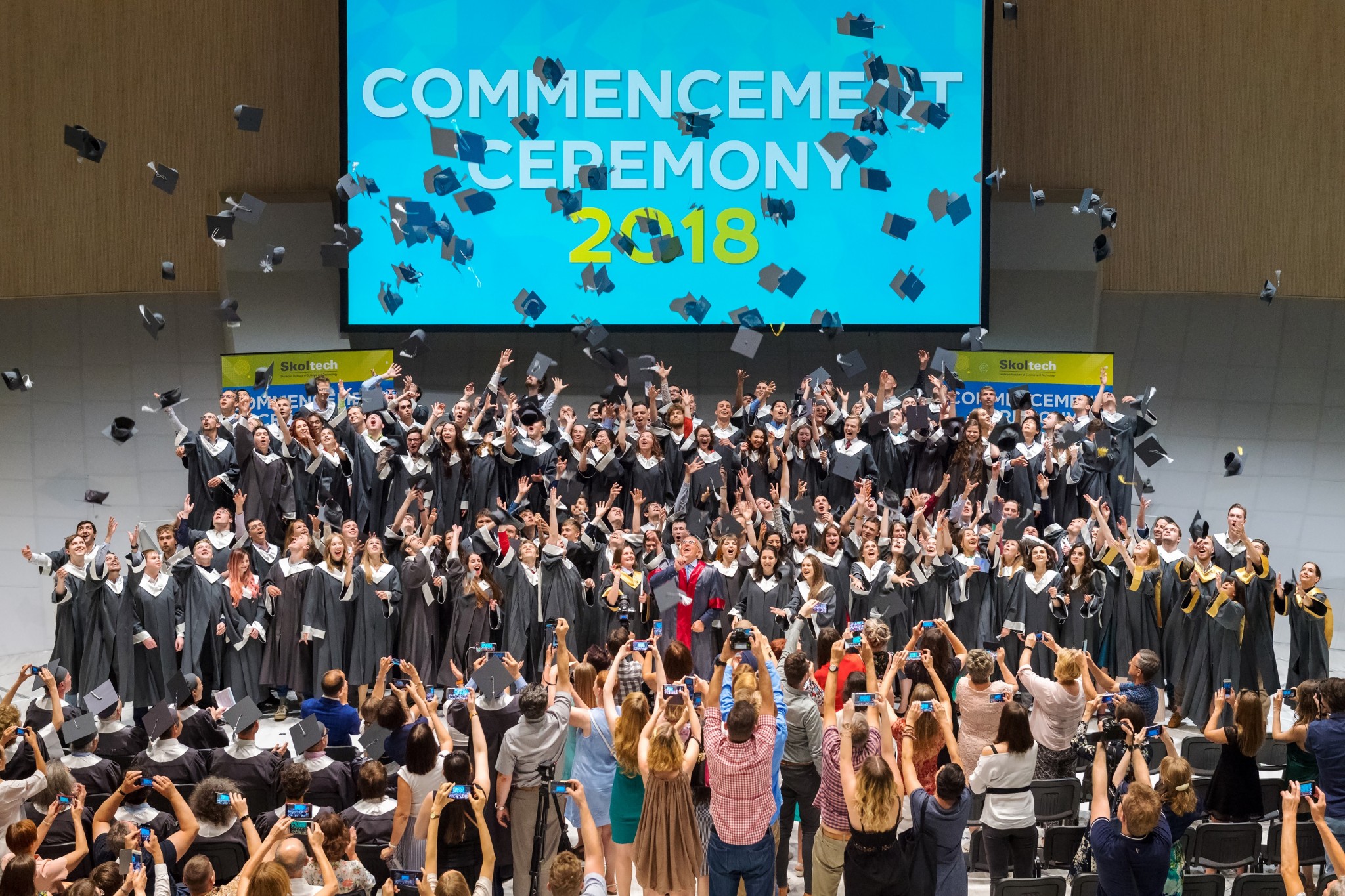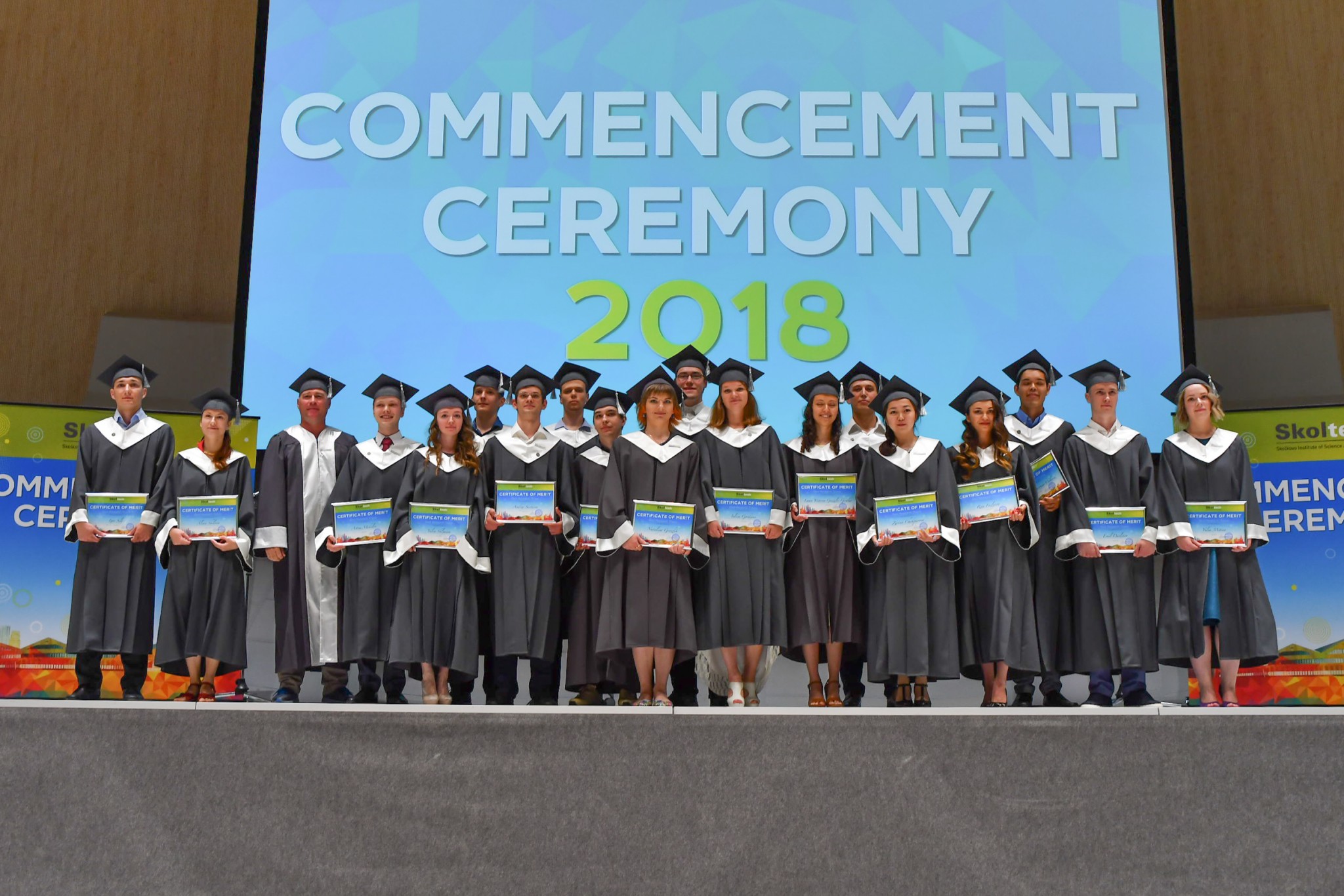
All of the winners of this year’s best thesis awards, pictured during the Skoltech graduation. Photo: Tim Sabiroff // Skoltech.
As Skoltech’s class of 2018 celebrated their graduation, a sense of optimism was palpable at the institute.
But as recently as a week earlier, the atmosphere was markedly different.
Each year in the weeks leading up to graduation, a feeling of urgency takes hold as second-year MSc students prepare to defend their theses.
More specifically, they prepare to stand before panels of revered external experts from academia and industry – experts with decades of experience in these students’ fields of study – and deliver a compelling presentation summarizing all that they have accomplished.
Not only do the students have to deliver strong presentations in English – which the majority at Skoltech speak as a second language – they also have to answer a flurry of detailed and often unpredictable questions.
To learn more about how to flourish amid this daunting process, we caught up with some of the top performers from this year’s cohort, as well as some of the great minds comprising Skoltech’s faculty, administration and thesis defense panels.
Grappling with the interplanetary problems of tomorrow
Recent Skoltech MSc graduate Shamil Biktimirov wowed his panel of reviewers with his research on the use of asteroid mining to meet the needs of a colony on Mars.
The prospect of colonizing Mars has gained momentum in recent years, with the likes of billionaire entrepreneur Elon Musk championing the red planet as Earth’s best bet for post-apocalyptic humanity.
“I think there are really two fundamental paths,” Musk said in a talk on the plans of his company SpaceX to colonize Mars. “History is going to bifurcate along two directions: One path is we stay on Earth forever, and then there will be some eventual extinction event… some doomsday event. The alternative is to become a space-faring civilization and a multi-planet species, which I hope you would agree… is the right way to go.”
But one logistical problem that has often loomed over considerations of a Mars colony is that of resources. Biktimirov devoted his MSc research to finding an asteroid-based solution to some of these woes.
“In my research, I conducted a feasibility study comparing two different approaches to supplying a colony on Mars. In one case, the hypothetical colony relied on shipments of resources from Earth. In the other, they relied on resources that could alternatively be mined from a group of near-earth asteroids. In the latter case, I relied on the assumption that in this scenario, the infrastructure is in place for asteroids to be mined, and for the mined resources to be delivered to Mars,” he explained.
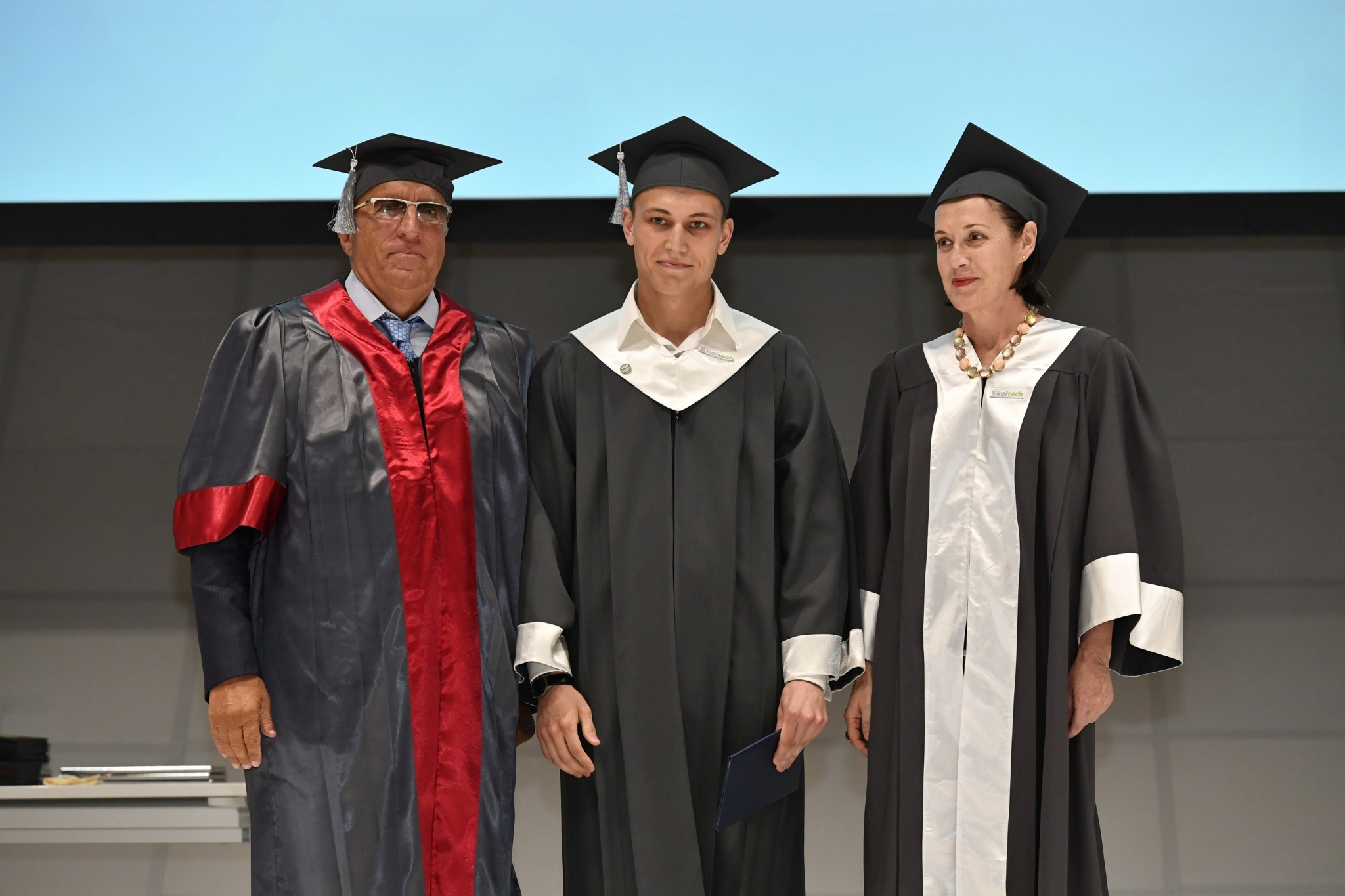
Biktimirov, pictured on stage during the Skoltech graduation ceremony, alongside Skoltech President Alexander Kuleshov and Dean of Education Anna Derevnina. Photo: Vitaly Shustikov // Skoltech.
His research revealed that the latter process would be considerably more cost effective.
“I found that by using asteroid resources, it is possible to significantly decrease the mass of an interplanetary spacecraft, thereby significantly lowering costs due to the fact that lower delta-v [ed: acceleration] is required for travel from an asteroid to Mars, as compared with travel from Earth to Mars. Moreover, I found that asteroid utilization could significantly increase the quantity of supplies delivered, thereby making it possible to support comparatively large colonies,” Biktimirov said.
Asked what he thought made his thesis stand out from those of his peers, Biktimirov pointed to both the complexity and the practical relevance of his research.
“My defense focused on modern space science, covering space logistics and the application of orbital mechanics to interplanetary transfer calculations, while also providing practical information that could be used for future space missions or the development of new technologies,” he said.
This balance between theory and practice is key to a strong thesis, according to Professor Alexander Efremov, Dean of the Aeronautical School at the Moscow Aviation Institute, who has served as head of the defense review committee for Skoltech’s Space and Systems Engineering students for the past three years.
“Some projects focus primarily on theory, with little consideration of practical elements such as design and engineering. Others were lopsided in the other direction. The best projects are those that strike a good balance between theory and application,” he said.
A grit-fueled rise to the top
Julia Gordeeva was honored for having delivered one of the best three thesis defenses from among this year’s biotech graduates – a particularly impressive feat considering how she got her start at Skoltech.
Three years ago, Gordeeva’s application for admission to Skoltech was rejected. She opted instead to pursue her MSc at the Moscow Institute of Physics and Technology (MIPT), where, during her first year of study, she began a collaboration with Professor Konstantin Severinov – Director of the Skoltech Center of Life Sciences (CLS).
“After a year of collaborating with [Severinov], he realized that Skoltech had made a big mistake by rejecting my application, so I was encouraged to apply one more time. Thus, after completing the first year of an MSc program in Applied Physics and Mathematics at MIPT, I enrolled in the Biotech program at Skoltech. I’m very pleased with how it has all turned out. Doing research at Skoltech gave me a great opportunity to broaden my knowledge and conduct several important experiments,” Gordeeva said.
Reflecting on Gordeeva’s rise to the top, Severinov concurred with her sentiment that it had been a “big mistake” not to accept her initial application.
“To me, Julia epitomizes what the best MIPT students are… She is absolutely fearless in what she does. I understand that this can-do attitude is acquired by the best students who survive the rigorous drilling of an MIPT undergraduate education. As a result, top MIPT graduates in general – and Julia in particular – are true problem solvers. They may not know how to approach a particular task, but they are not deterred by this. They are confident that they can, and in fact do solve problems as they arise,” said Severinov. He also pointed out that in addition to her top thesis award, she graduated with high honors, earning her a rare double distinction.
This grit and determination carried Gordeeva through a particularly trying research project as she prepared her thesis, which focused on bacteriophage exclusion defense system BREX.
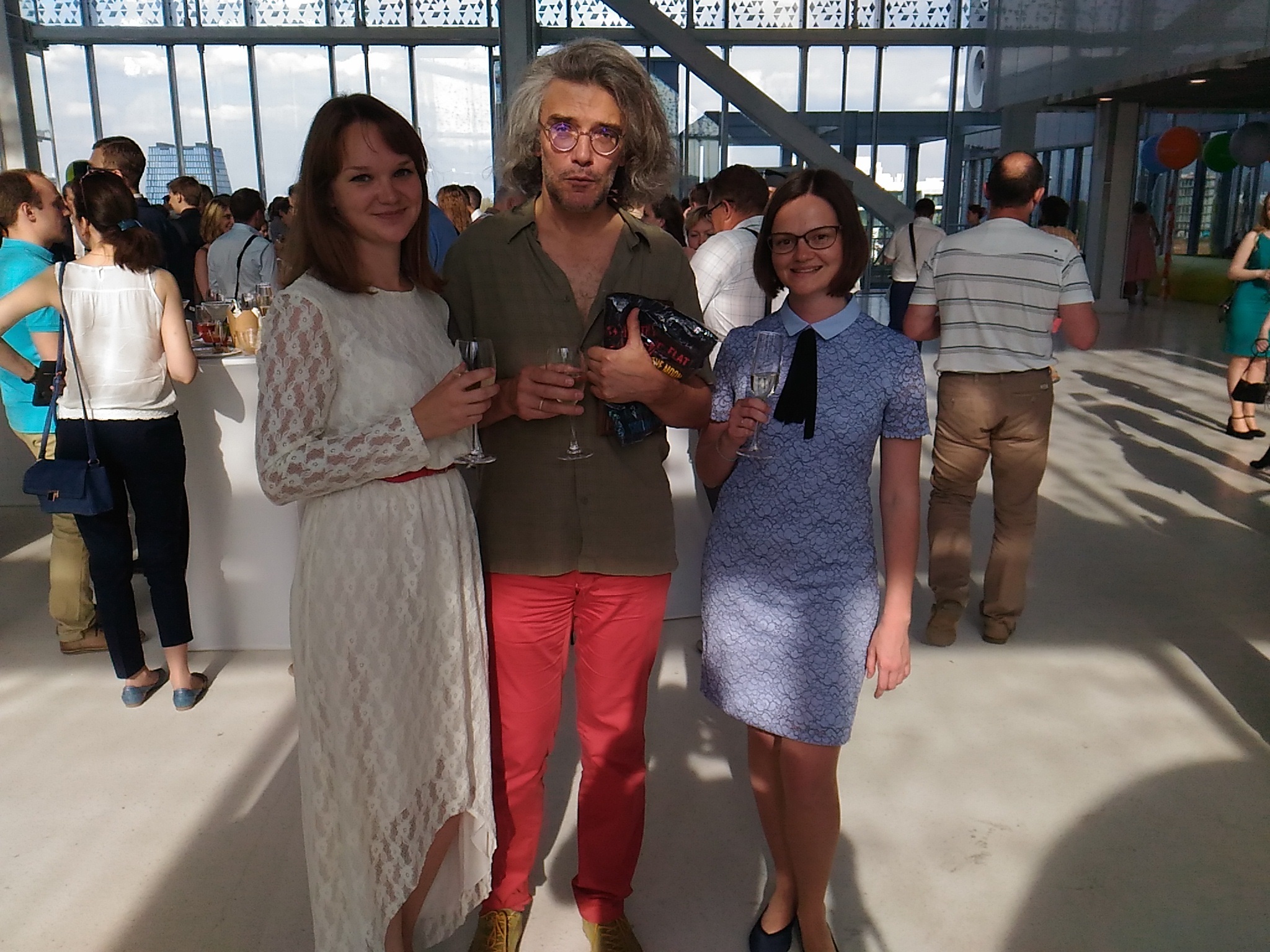
Yulia Gordeeva (left), pictured with Professor Konstantin Severinov, and recent Skoltech PhD graduate Maria Sokolova. Photo: Skoltech.
“BREX is a newly discovered system that defends bacteria from their viruses, which are known as bacteriophages. This system consists of several genes whose mechanism of action is poorly characterized. Although the system shares some similarities with a few known defense systems, the mechanism is novel,” she said.
With her thesis project, Gordeeva strived to shed light on this murky area, and her hard work paid off. In addition to winning one of the top thesis prizes, she wrote a paper about her research which is currently under review for publication by a major scientific journal.
“In our paper, we tried to answer two main questions: how the BREX system recognizes the self, i.e., the cell it protects, and kills the non-self, i.e, the infecting virus, and what stage of phage infection is inhibited by the system. To solve the first problem, I went to the R&D department of tobacco company Philip Morris in Switzerland, which possesses state-of-the-art sequencing equipment – a PacBio platform. Using this technique, I analyzed the DNA of phages capable of overcoming the BREX defense. To answer the second question, I joined Professor Lanying Zeng’s laboratory at Texas A&M University, where I examined how phage injected its DNA into BREX-carrying cells using fluorescent microscopy. Although we managed to answer the first set of questions, we are still clueless as to how BREX destroys the incoming virus. Now we are conducting new experiments to completely crack the BREX mystery,” said Gordeeva.
As explained by Severinov: “It took her a year of hard work in Moscow and trips to two different labs abroad to bring the project to completion, but she did it. And at no point during the process was she nagging people, asking them to explain to her how to do something, how to use this or that piece of fancy equipment, etc. She just went straight in and figured it out for herself.”
Her no-nonsense approach left Severinov’s international collaborators awestruck. “They wrote me letters afterwards with sentiments like, ‘If this is the sort of MSc students you have at Skoltech, we can’t even imagine the quality of your PhD students and postdocs,’” he said.
Gordeeva has decided to continue her scientific adventures at Skoltech as a PhD student.
No humans needed
Miguel Altamirano Cabrera left an impression on his reviewers with his work on a robot capable of disassembling smartphones for quick and efficient recycling. He conducted his thesis research in the context of RecyBot – a joint project being carried out by the labs of Skoltech Professor Dzmitry Tsetserukou and Massachusetts Institute of Technology (MIT) Professor Kamal Youcef-Toumi.
“The goal of the Skoltech-MIT project RecyBot is to create a smart robotic system for the automatic disassembly of smartphones, helping to reduce electronic waste and boosting the potential to recover valuable materials,” Altamirano Cabrera said.
He focused on a narrow portion of the overall project – the unscrewing process.
“Until recently, industry actors have focused primarily on assembling electronics. Many people have worked on ways to do this more quickly and efficiently. But companies were less interested in disassembly and the recycling of materials in electronics. That said, quantities of electronic waste have soared in recent years, causing industries to examine this process more intensively – not only to make an environmental impact, but also because it represents an important source of limited materials,” he added.
A key problem Altamirano Cabrera faced was the tendency of screws to become unattached from screwdrivers and prematurely fall away during the unscrewing process.
“To reduce the likelihood of slippage, we studied how humans typically perform this operation. After a series of experiments, we observed certain human haptic patterns and applied them to our robotic system. In short: human haptic patterns taught our robots to unscrew in a more robust way,” he explained.
Even prior to his thesis defense, Altamirano Cabrera earned praise for his research. He was invited to present his work at leading international haptics conferences, including the IEEE Haptics Symposium 2018 in San Francisco, California, and EuroHaptics 2018 in Pisa, Italy.
“It very rare for a student to be invited to participate in two international conferences during their MSc education, and this is a quality that we need at Skoltech,” said Tsetserukou, Altamirano Cabrera’s research advisor.
Asked what he thought set his work apart in the eyes of the committee, Tsetserukou pointed to the novelty of Altamirano Cabrera’s project – particularly the aspect of using human patterns to train robots to unscrew.
“His work was particularly important because it relied on human patterns to teach a robot to unscrew. This is a technology that could be used in the future to create automated digital factories. All of the electronics companies out there that use automated processes for assembly could benefit from [Altamirano Cabrera’s] research project,” said Tsetserukou.
Behind the scenes of Skoltech’s MSc defenses
For the past two years, Anna Derevnina, Skoltech’s Dean of Education and Associate Provost, has served as the brains behind Skoltech’s MSc defense process.
Her responsibilities run the gamut from ensuring that MSc students are adequately prepared to defend their theses, to delegating administrative work so as to minimize bureaucratic drudgery for faculty members, to assembling various expert panels to assess student defenses across a broad range of fields.
“For each educational track, we need to establish a panel that’s chaired by a recognized specialist in the field – a professor or other expert. This person must be approved by the Russian Ministry of Education and Science. The other panel members likewise comprise experts from industry and academia. The external perspective they bring is very important to the success of our thesis defenses,” said Derevnina during a recent interview.
She noted that she and her team in Skoltech’s Education Office strive to retain the members of each panel to the largest extent possible from year to year in order to foster a sense of continuity.
Toward that end, Efremov, the abovementioned expert who heads the Space panel, noted that the consistency of the level of Skoltech graduates over the years has been a highlight for him.
“Sometimes I’m asked for a comparison of the students that we have now, versus those that we had in previous years, and in fact, I believe that Skoltech has managed to maintain a consistently high level of students in the three years that I’ve been involved in this process. This is perhaps a peculiarity of Skoltech that it has managed to achieve this, and I wish you to keep this high level in the years to come,” he said.
“Practically all of the students are real engineers – even as MSc students, I believe they are prepared to solve highly complicated engineering tasks,” he added.
One element that sets the Skoltech defense process apart is an elaborate system of pre-defense practice rounds, during which students are given feedback and advice on how to perfect their final defenses.
In addition, they are provided with English-language resources. “It’s a daunting task for any student to prepare a thesis defense, but Skoltech presents a unique challenge in that students are expected to deliver their defenses in English, which most of them speak as a foreign language. To help the students overcome this hurdle, our English professors, Elizaveta Tikhomirova and Anastasia Sharapkova are on hand from the start to provide advice on delivering presentations in English, as well as to help them fine-tune their papers,” she said.
*During Skoltech’s recent graduation ceremony, awards of excellence in research were given to the 18 students who delivered the best thesis defenses from among their respective educational tracks.
They included: Alexey Kovalov (MSc: Computational Science and Engineering, Advisor: Andrey Ivanov); Igor Silin (MSc: Data Science, Advisor: Vladimir Spokoiny), Alena Shilova (MSc: Data Science, Advisor: Yury Maximov), Arshak Minasyan (MSc: Data Science, Advisor: Vladimir Spokoiny), Artem Korenev (MSc: Data Science, Advisor: Pavel Boyko), Julia Gordeeva (MSc: Biotechnology, Advisor: Konstantin Severinov), Artem Mikelov (MSc: Biotechnology, Advisor: Dmitry Chudakov), Yulia Mitina (MSc: Biotechnology, Advisor: Yuri Kotelevtsev), Emil Davletov (MSc: Photonics and Quantum Materials, Advisor: Alexei Buchachenko), Yulia Sklyueva (MSc: Photonics and Quantum Materials, Advisor: Albert Nasibulin), Vladislav Kurilovich (MSc: Mathematical and Theoretical Physics, Advisor: Igor Burmistrov), Mykola Semenyakin (MSc: Mathematical Physics, Advisor: Andrei Marshakov), Nataliya Gvozdik (MSc: Materials Science, Advisor: Keith Stevenson), Laura Victoria Gonzalez Giraldo (MSc: Energy Systems, Advisor: Aldo Bischi), Rita Fazyleva (MSc: Petroleum Engineering, Advisor: Alexey Cheremisin), Miguel Altamirano Cabrera (MSc: Space, Advisor: Dzmitry Tseterukou), Andrey Sartison (MSc: Space, Advisor: Dzmitry Tseterukou), Shamil Biktimirov (MSc: Space, Advisor: Anton Ivanov) and Zarina Chokparova (MSc: Advanced and Digital Engineering Technologies, Advisor: Ighor Uzhinsky).
